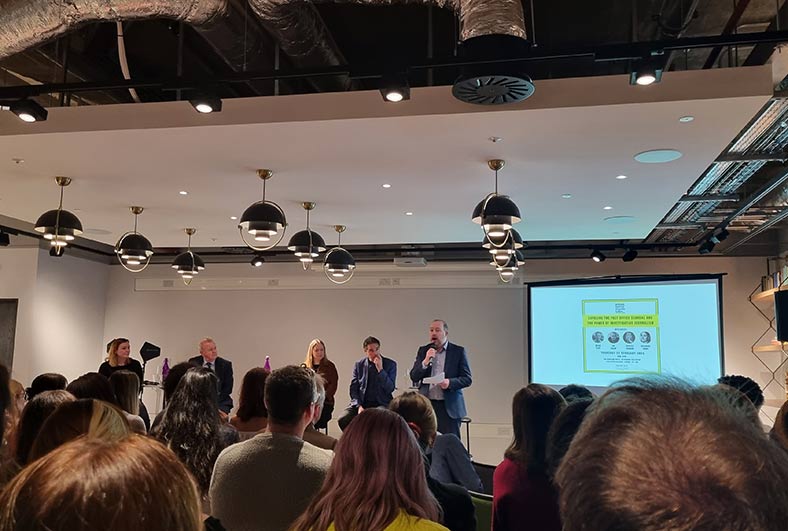Blog / Events / Journalists
The challenges and the rewards of investigative journalism

All of the major national newspapers and broadcasters have been covering the Post Office scandal, but the story itself actually started as a piece of investigative journalism nearly twenty years ago. At a recent BSME event, the journalist that broke the story in Computer Weekly, Rebecca Thomson, spoke about the scandal and the importance of investigative journalism. She was joined by panelists Ian Hislop, editor of Private Eye, Bryan Glick, editor-in-chief of Computer Weekly, and Rosamund Urwin, media editor of The Sunday Times.

Sticking with the story
Alan Bates wrote to Computer Weekly’s then executive editor, Tony Collins, in 2004 about the issues with the Horizon IT system. Tony couldn’t do anything with just one source but kept the letter. Four years later, Lee Castleton wrote to the magazine also and Tony was able to connect the two issues. Rebecca was then given the letters and told to investigate for a story.
‘We had seven case studies and I think we had others. It was quite a lot more but you just wouldn’t go on the record because it was quite a scary thing to do’, said Rebecca. The amount of case studies they had meant they feltl comfortable enough to run a cover story about the Post Office scandal in 2008. Rebecca admitted she was ‘disappointed’ with the lack of interest at the time.
Computer Weekly’s now-editor-in-chief Bryan Glick shared that since that first story, ‘in total, we have now done nearly 400 stories’ on the Horizon IT system. Ian Hislop, whose Private Eye magazine ran its first story on the issue in 2011, said the key to gaining traction on such a story is to ‘stick with it’:
‘A lot of newspapers have a problem in that the editors get bored pretty quickly. On a magazine, you have the advantage that you can just do it again and your readers trust you. They think, okay, they’ll have something else to say and we’ll stick with it, and that’s because magazine readers are more of a club.’
Following journalistic instincts
Investigative journalism, as with this case, can take a long time before it gets the press coverage it warrants. ‘The Post Office told every single person, “You’re the only one who’s having this problem,”’ shared Bryan.
‘Rebecca was the first person who was able to talk to all those people and put that together. You don’t need to know anything about technology. A journalist can see that something’s not quite right.’
In addition to journalistic instincts, the way people or organisations react to articles can also be an indicator as to the right track for a story. Ian mentioned that ‘The first story Richard ran about the Post Office scandal was immediately met with an immensely aggressive letter from them. So you think, “Great – it must be true”.’
He went on to speak about following the money to get to the bottom of the story:
‘It’s just a straightforward commercial decision. If we admit this thing (Horizon) doesn’t work, we’re going to have to pay up and we won’t get the next commission. It was turning the outrage into what is the actual story here, and that is from the bottom to the top – everyone was acting out of self interest.’
Earning trust and better collaboration
The Sunday Times’ Rosamund Urwin admitted that newspapers were slow to pick up on the Post Office scandal story:
‘My colleagues actually interviewed Rebecca and the then-deputy editor said it was a very important story. But I certainly think you get editor fatigue. It was all there for us to do, but we should be smarter at following things up.’
Rosamund also shared the view that there needs to be greater collaboration across the industry, especially when it comes to investigative journalism. This is something that she has tried to do more of while exploring Me Too cases and her story on the alleged abuse by Russell Brand.
For stories that are as sensitive as Me Too or centre around a big corporation like the Post Office, earning the trust of the people involved to tell their story is vitally important – ‘Getting somebody to trust you, you have to be somebody that’s trustworthy,’ said Rosamund. For the Post Office story, where additional proof was required, Rebecca had to ‘explain the whole process as we went, also explaining why it was taking so long.’
Bryan believes that ‘trust is earned over time,’ that Computer Weekly had ‘built up trust among its readership for having done investigative journalism before and exposed things in the past. There’s a trust that comes with the brand.’
All of this helps to get people to tell their story. For Ian at Private Eye, it’s even more simple:
‘The way to earn people’s trust is to admit that you’re a journalist. You’re not a social worker. You’re not the police. In the end, you’re offering a way to get this story out. You’re not offering resolution or closure. None of those things are in your power. What you’re offering is a platform for whatever has happened for you to go to a wider audience.’